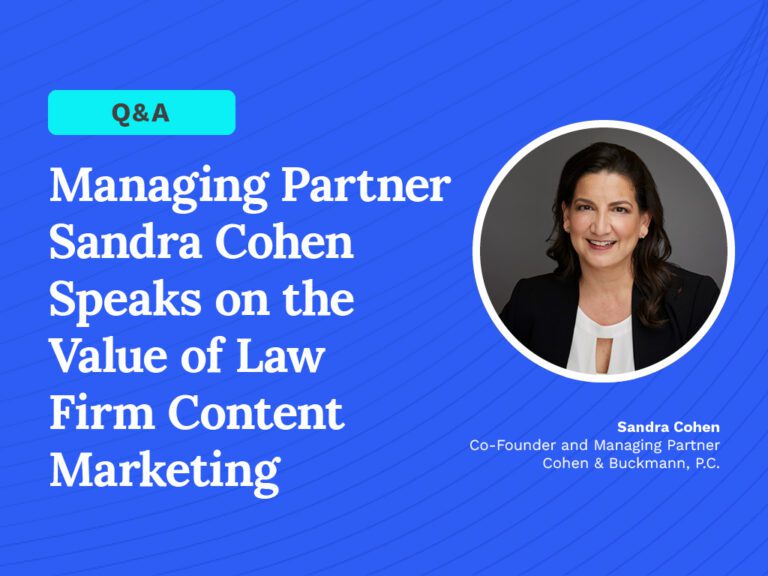Managing Partner Sandra Cohen Speaks on the Value of Law Firm Content Marketing
May 5, 2025

Managing Partner Sandra Cohen Speaks on the Value of Law Firm Content Marketing
In this exclusive interview with Today’s Managing Partner, Cohen & Buckmann Managing Partner Sandra Cohen talks about the value of law firm content marketing. We also spoke with her about client-focused billing arrangements and AI for this article.
Today’s Managing Partner has published several articles highlighting the significance of content marketing for law firms. Can you elaborate on how sharing your expertise through these content pieces adds value for your law firm?
Sandra Cohen: Creating content that demonstrates your firm’s skills and experience provides multiple layers of value for your law firm. When attorneys share insights through articles, videos, podcasts, social media, or other mediums, they’re not just making a “marketing pitch” — they’re demonstrating awareness of their clients’ top issues and showing their knowledge in action.
When you show that you care about what clients are worried about, it helps bring your firm’s capabilities to potential clients who are researching their options. It builds credibility in your practice areas and positions your attorneys as thought leaders in their fields. And over time, this library of content creates a searchable knowledge base that draws prospects to your firm when they’re seeking answers to specific legal questions.
Consistently producing thought leadership content, including articles, news items, and webinars, strengthens existing client relationships by providing ongoing value beyond billable matters. It can also open doors to a broader professional network, as it invites opportunities such as speaking engagements, media opportunities, and referral partnerships.
Our practice encompasses executive compensation, employee benefits, and pension law, which some may view as niche. However, it actually involves many legal fields, including contract law, employment law, tax law, securities offerings, and company mergers and acquisitions. Projecting credibility across these disparate areas of law is key, and it’s why we prioritize producing relevant content.
However, managing partners must recognize that not every content format works for every attorney. Some lawyers thrive at writing detailed analyses, while others shine in podcast interviews or video presentations. To be successful, your firm’s content strategy should align with each attorney’s natural communication style and interests.
What kinds of content does your firm produce?
Sandra Cohen: We don’t advertise in paid venues. Instead, Cohen & Buckmann lawyers do a lot of content marketing, meaning we’re writing articles, taking interviews, participating in panels, and continuing legal education for lawyers. We also maintain an “Insights” blog that draws high traffic and engagement from clients, other lawyers, and journalists. Our blog addresses timely topics in our field of compensation and benefits with concise, to-the-point commentary on developments in our practice areas. We also send periodic emails with important legal developments to a broad list of email subscribers, so we stay top of mind without overwhelming their inbox.
I encourage our attorneys to generate thought leadership in a way that is most comfortable for them. Rather than imposing a one-size-fits-all approach, I’ve aimed to identify and nurture each attorney’s strengths. For example, if you like to speak, find opportunities to do so — whether it’s presenting at a conference or leading a discussion over lunch with a small group. Marketing your practice in a format you genuinely enjoy will lead to more consistent participation and authentic, compelling insights that resonate with your audience and build long-term trust.
When we write, we aim to be concise. Nobody wants to read a legal treatise, and we are writing not only for other lawyers but for clients and potential clients as well. Even lawyers don’t want to read legalese when they don’t have to. They want a quick, actionable summary of what matters most and what they should do about it.
Our blog has a distinct voice, and we are not shy about giving opinions. For example, if we think a court’s latest decision is problematic, we’ll discuss the current law and what we think clients should do. We try to be practical in that way.
My partner, Carol Buckmann, loves to write for the firm’s blog, and she has built a strong following because her writing is accessible and to the point. She’ll explain, “Here’s what they got wrong, here’s what they got right, and here’s what I recommend you do next.” Thought leadership is a worthwhile investment for her because it has a big impact, and her blogs frequently get picked up by other publications.
How important is social media for your firm?
Sandra Cohen: We use social media to increase visibility for the content that we have produced. It also helps us keep in touch with our friends and referral partners, and to reach potential clients. We don’t spread ourselves too thin on a variety of social channels; rather, we focus on LinkedIn for communicating our content and firm news.
LinkedIn can be challenging because many people read posts without engaging, but that doesn’t mean they’re not paying attention. I often hear about the impact later on — sometimes in unexpected ways, with other lawyers telling me, “I love your firm’s marketing” when I know they are referring to LinkedIn posts they saw. Some potential clients reach out and say, “I read your post, and I’d like to hire you.” Or perhaps someone we haven’t spoken with in years mentions how much our law firm has grown, which is something they wouldn’t have known about without our social media presence.
What about lawyers who are just getting started in their careers? How should they approach thought leadership?
Sandra Cohen: For young lawyers who might be thinking, “Well, I’m not well-known like Carol Buckmann, so why should I write?” remember that writing demonstrates expertise. Clients want to hire lawyers they trust and who truly know their field.
Thought leadership can help. For instance, when a client asks, “Can you prepare my company’s equity plans for an IPO?” it’s one thing to confidently say, “Yes, absolutely!” But it’s another to have the goods to back it up. You might know all the law, but if you don’t show it, if your bio doesn’t reflect the experience you have with that work, then writing can fill the gap. By sharing insights, you show — not just tell — clients what you know.
Many younger lawyers believe they need to write about a groundbreaking development before they can contribute to thought leadership. I don’t think that’s true. There’s value in writing about familiar subjects. Some of our best content comes from common client questions. It’s not about being the foremost expert; it’s about making complex issues understandable.
For those unsure about writing, I recommend junior lawyers start small. Writing, creating a video, or speaking on a panel, even just once a year, is fine, and you don’t have to do it alone. It’s OK to co-author with a colleague, interview an expert, or moderate a panel. If you’re not ready to be a keynote speaker, then organizing a panel of other experts puts you in front of the right people. If you’re not an expert (yet), go interview someone you admire. Over time, these connections can lead to bigger opportunities.
Thought leadership isn’t just about visibility — it’s also a powerful networking tool. By engaging in professional circles in this way earlier in my career, I was eventually asked to author a Bloomberg BNA book on global share plans and to contribute a chapter to an important treatise on Code Section 409A. Those opportunities came from putting myself out there and getting known, for example, in bar associations and peer groups. For young lawyers, the key is to start somewhere. The rest will come.
Get the free newsletter
Subscribe for news, insights and thought leadership curated for the law firm audience.



